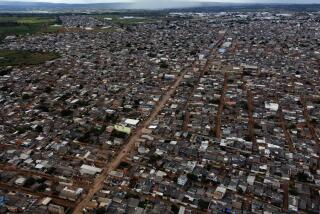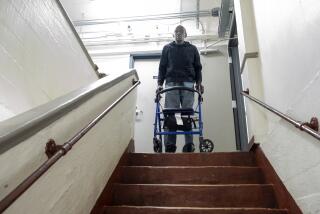Erratic Angola Elevator a Test for Dignitaries
- Share via
LUANDA, Angola — This is a capital where gunfights erupt in the streets, the tap water reeks like sewage, and mosquitoes carry a strain of malaria that can kill you overnight.
But what makes visitors really fear for their lives? The elevator at the Hotel Le Meridien Presidente, which has a nasty habit of dropping 20 stories at a time.
An erratic elevator in a developing nation ravaged by three decades of civil war may seem as ordinary as a traffic jam on a Los Angeles freeway. But this is not an ordinary elevator, and its white-knuckled passengers are not ordinary visitors.
Despite its faded looks, the oceanfront Presidente is the Angolan capital’s premier address for visiting dignitaries. The guest register includes everyone from South African President Nelson Mandela to U.S. Secretary of State Madeleine Albright. French President Jacques Chirac is booked in June.
Last month, a delegation of antigovernment rebels chose the exclusive location to announce their relocation to Luanda, a crucial milepost in the country’s on-again, off-again peace process. Leading members of the National Union for the Total Independence of Angola, known by its Portuguese acronym, UNITA, have been abandoning their rebel outposts as part of a 1994 agreement that recognizes the U.S.-backed rebel movement as a legitimate political organization.
But after a fancy news conference, the rebels were taken for a hair-raising ride that nearly sent them running for cover back at their outposts. The elevator rose from the eighth to the 22nd floor--and then suddenly fell to the ground, abruptly coming to rest in an underground shaft several feet below the main floor.
No one was hurt, but the nine passengers--including Antonio Dembo, second-in-command to UNITA leader Jonas Savimbi--pried open the doors, climbed out of the elevator and stormed into the lobby prepared for an ambush. UNITA has long maintained that Savimbi cannot leave his remote headquarters in the central highlands because of continuing “political insecurity” in the capital; the plummeting elevator has become a case in point.
“They thought it was sabotage and someone was trying to kill them,” said an official with the U.N. peacekeeping mission here.
“I don’t know what happened, and I know it scared the people inside,” said hotel general manager Mario Solleiro. “But the lift did not drop uncontrollably for 22 floors. If it did, they would be mashed potatoes.”
Solleiro has apologized for the episode, but so far words have not been enough to put UNITA’s suspicions to rest. In an attempt to clear the air, the hotel has agreed to an investigation by a Luanda court, which is trying to determine who was responsible for the fright.
The elevator, in the meantime, has been sealed shut, and guests are being directed to the hotel’s four other elevators, which have been otherwise avoided because they are older, look like wobbly sardine cans and have spotty records of their own. Security personnel have preferred the single large elevator because it fits the bloated entourage of bodyguards that usually stand shoulder-to-shoulder with high-level guests.
“I can assure you there was no conspiracy, that it was merely a technical problem,” Solleiro said. “If this incident had happened to me or any other guest, the elevator would be operating right now. But because of the repercussions--and to put aside the political dimensions--we will let the court decide what really happened.”
The UNITA plunge couldn’t have come at a worse time for the hotel’s management, which thought its elevator woes were finally behind it.
The faulty elevator has been in operation only since February, when it replaced a 15-year-old model that was removed after causing its own diplomatic snafus. Among those who fell victim to the former elevator: Albright, who spent 20 minutes trapped inside during a visit two years ago while she was a U.N. ambassador, according to a U.S. official.
At one point, stranded passengers and long waits became such a routine at the Presidente that hotel officials opened the staff elevator to guests. But even that solution caused Solleiro headaches when, packed with then-Botswanan President Ketumile Masire and his security detail, the doors closed but the elevator would not budge. In a separate incident, another elevator reportedly took a dive just as Masire was about to board.
As shocking as such tales may sound, the sad fact of life in Luanda, longtime residents say, is that its elevators are only as reliable as the city’s crumbling electrical system. When the power fails, as it often does, so does the city’s fleet of colonial-era elevators, many of which have not been serviced since Angolan independence from Portugal in 1975.
At a high-rise office building on the edge of town, workers said they will enter the creaky elevators--which have no doors and no lights--only if someone has a walkie-talkie to summon help. In other high-rises, skeptical workers and residents said they use the stairs, even if it means climbing five or six stories.
Newcomers to the capital from the country’s rural provinces are particularly hesitant to try their luck.
“These people have been living in the bush for most of their lives, and suddenly they find themselves stuck in an elevator,” said a longtime diplomat in Luanda. “They begin to visibly shake. I can understand the fear. The elevators here are terrible all of the time. They scare everyone.”
Dembo and his fellow passengers, Solleiro said, may be a case in point. While acknowledging that the 22-story ride was undoubtedly terrifying, Solleiro said it probably seemed worse because the group was not accustomed to traveling in elevators, particularly Luanda-style.
Since stalled and falling elevators can usually be traced to power fluctuations, the hotel has begun operating its elevators on generators when high-profile guests are in town. But even the generators did not spare the UNITA passengers last month.
Solleiro suspects that he may have fallen victim to his own good intentions. After suffering so many problems with the old elevator, the hotel chose a state-of-the-art Italian model as its replacement. But high-tech in Luanda, it turns out, can mean high drama. The new elevator’s complex electrical components, he said, may be too sensitive for the city’s primitive conditions.
The hotel has several enormous filters to treat city water and four backup generators to provide electricity. Workers are now building a sleek business center to cater to demanding European and American visitors. But, Solleiro said, there is only so much the four-star hotel can do to shut out the world beyond its shiny glass doors.
“It is hard,” he said. “As much as you try, you can’t be an island.”
More to Read
Sign up for Essential California
The most important California stories and recommendations in your inbox every morning.
You may occasionally receive promotional content from the Los Angeles Times.













